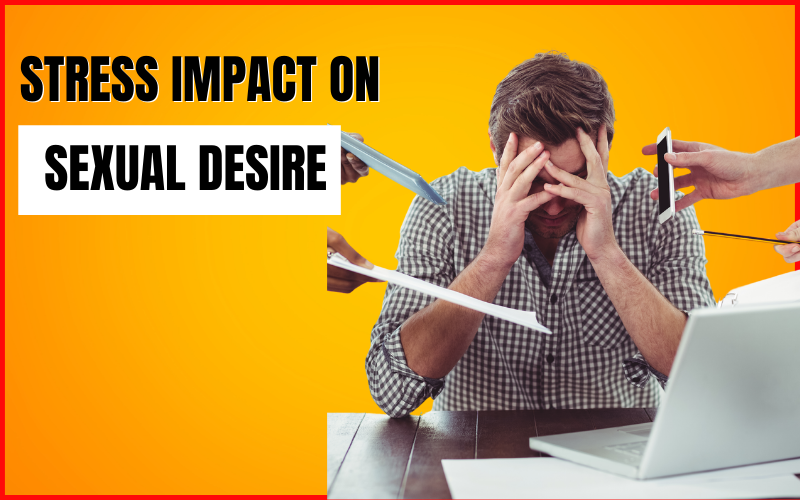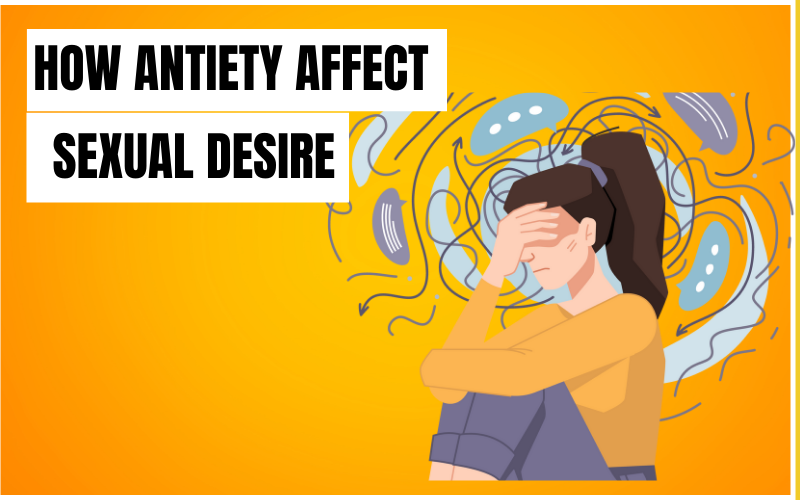
Sexual desire is a complex interplay of biological, psychological, and emotional factors. Research has shown that dopamine, often referred to as the “pleasure hormone,” plays a central role in triggering sexual interest and arousal.
However, when anxiety enters the equation, it disrupts this process by activating the brain’s stress response system. High levels of cortisol, the body’s primary stress hormone, suppress the production of dopamine and testosterone both of which are critical for sexual function.
A study published in The Journal of Sexual Medicine found that men with chronic anxiety exhibited significantly lower testosterone levels and higher rates of hypoactive sexual desire disorder (HSDD). This suggests that anxiety does not just impact performance in the moment but can also contribute to long-term sexual dysfunction.
Understanding the connection between sexual desire and anxiety is crucial because it debunks the myth that sexual desire is purely physical. While many men believe their struggles stem from a physical deficiency, the reality is often more psychological.
Anxiety-induced sexual dysfunction is not an inherent flaw but a conditioned response that the brain learns over time. By addressing the root cause fear and self-doubt rather than just the symptoms, men can reclaim their confidence and revive their desire naturally.
Two years ago, I found myself in the heart of Istanbul, Turkey, a city that offers everything in abundance except for what I secretly longed for: a Haitian woman. The cultural and geographical distance between Haiti and Turkey made the prospect of finding someone from my homeland nearly impossible.
Yet, by an improbable stroke of fate, I encountered Tham a strikingly beautiful Haitian woman whose presence ignited a spark of familiarity in a foreign land.
Despite our growing intimacy, I skillfully evaded the inevitable. We lived apart, making it easy to maintain the illusion of control. But when Tham suggested moving in with me for a month before my relocation to South Korea, I faced an inescapable reality. I had agreed without hesitation, unaware that this decision would push me to confront the very fear I had been suppressing.
For an entire month, Tham lay beside me each night, unaware of the war waging within me. I desired her intensely, yet every attempt at initiating intimacy was thwarted by a paralyzing anxiety.
Each time she reached for me, I feigned sleep. When she finally drifted off, I would watch her, consumed by admiration and self-loathing in equal measure. My body responded to her presence, yet my mind sabotaged every impulse.
This internal battle between desire and anxiety creates a paradox—the more you want something, the more your fear of failing sabotages it. It’s as if your mind erects invisible barriers, convincing you that the risk of embarrassment outweighs the potential for pleasure.
This fear is not just about performance; it’s about self-perception, about whether you are “enough.” And the cruelest part? The more you allow anxiety to dictate your actions, the more it reinforces the belief that you are incapable, trapping you in a cycle of avoidance and unfulfilled sexual desire.p

Anxiety is a master manipulator, capable of turning the strongest sexual desire into insurmountable fears. It heightens self-awareness, distorting perception and magnifying imagined failures. The very act of anticipation can trigger a cycle of physiological responses elevated heart rate, shallow breathing, and muscle tension all of which are counterproductive to sexual performance.
The irony is that sexual desire and anxiety cannot coexist. While desire thrives on anticipation and pleasure, anxiety feeds on doubt and over analysis. In my case, the fear of failing in the bedroom overpowered my natural instincts. I had convinced myself that my performance would define my worth, and in doing so, I robbed myself of the experience entirely.
This internal war is not just psychological it manifests physically, creating a feedback loop where the fear of failure leads to actual failure. The body, primed for stress rather than intimacy, betrays itself.
Blood flow redirects away from the genitals, muscles stiffen, and the mind races with intrusive thoughts. The very thing I feared being unable to perform became a self-fulfilling prophecy, reinforcing the belief that I was inadequate. The harder I tried to control it, the worse it got. Anxiety had hijacked my desire, replacing passion with paralysis.
It was on the final night before my departure that I came to a painful realization. As I lay awake, staring at the ceiling, a wave of regret washed over me. I had spent an entire month with a woman I deeply desired, yet I had failed to embrace a single moment of true intimacy. Not because I lacked attraction, but because I had surrendered to fear.
Sexual desire is not merely a biological response; it is a psychological state influenced by confidence, relaxation, and emotional connection.
Anxiety, when left unchecked, has the power to suppress this state, leading to avoidance behaviors and a cycle of self-reinforcing failure. In that moment, I understood that my issue was not premature ejaculation—it was the fear of premature ejaculation.
This realization hit me with crushing weight anxiety had not only stolen my present but had rewritten my past. Every moment I hesitated, every night I pretended to sleep, and every touch I avoided was not a reflection of my ability but of my mind’s relentless grip on fear.
I wasn’t just battling a physical issue; I was trapped in a psychological maze of self-doubt and performance pressure. The problem was never my body it was the belief that my body would betray me. And in believing it, I had made it so.
Addressing sexual anxiety requires more than wishful thinking. It demands intentional action and a shift in mindset. The first step is recognizing that performance anxiety is not a reflection of inadequacy but rather a conditioned response that can be unlearned. Techniques such as mindfulness, breathing exercises, and progressive desensitization can help rewire the brain’s association with sexual activity.
Equally important is communication. Many men suffer in silence, assuming that vulnerability equates to weakness. However, sharing these concerns with a partner can alleviate much of the pressure that fuels anxiety. A supportive and understanding partner can transform a seemingly insurmountable problem into a shared journey toward improvement.
Moreover, breaking free from the cycle of anxiety requires embracing imperfection. The pursuit of flawless performance is a futile endeavor that only reinforces self-doubt. Instead of obsessing over outcomes, focusing on presence and connection can create a more fulfilling experience.
Sexual intimacy is not a test to pass but a shared moment of pleasure and exploration. When the emphasis shifts from proving oneself to simply enjoying the moment, anxiety loses its grip, and desire can flourish naturally.
Performance anxiety affects millions of men worldwide, yet it remains one of the least discussed issues in male sexual health. A 2018 study in the Indian Journal of Psychiatry found that 71% of men with alcohol dependence also suffered from erectile dysfunction (ED), with 69% experiencing premature ejaculation (PE) and 62% reporting low sexual desire. While alcohol was a contributing factor.
The underlying issue in most cases was performance anxiety an overwhelming fear of not satisfying a partner that lead to a low sexual desire. This fear creates a vicious cycle: anxiety leads to physical symptoms like rapid heartbeat and muscle tension, which then interfere with arousal and erection maintenance.
Breaking the cycle of low sexual desire requires a shift in focus. Instead of fixating on achieving an idealized standard of sexual performance, men must prioritize emotional connection and pleasure.
Engaging in mindfulness practices, such as deep breathing and progressive muscle relaxation, can help recondition the brain to associate intimacy with relaxation rather than stress. Studies have shown that men who incorporate these techniques report significant improvements in erectile function and overall sexual satisfaction.
Looking back, I regret not confronting my fears sooner. The price of avoidance was high—missed opportunities, emotional distress, and a prolonged battle with self-doubt. Yet, the experience served as a turning point, compelling me to seek knowledge, practice control techniques, and ultimately reclaim my confidence.
For any man struggling with sexual anxiety, the solution is not found in external validation or quick fixes. It lies in understanding the mind-body connection, addressing the root causes of fear, and gradually building a sense of control over one’s responses. True confidence in the bedroom is not about eliminating the possibility of failure but about learning to navigate it without fear.
Sexual desire is not lost; it is often buried beneath layers of self-doubt and anxiety. The moment we decide to challenge these barriers rather than succumb to them, we reclaim the pleasure, intimacy, and connection we deserve.
However certain practical steps can help reframe their mindset and rebuild confidence. One effective strategy is cognitive restructuring a psychological technique that challenges negative thought patterns and replaces them with more positive, realistic beliefs.
Instead of catastrophizing potential failure, men can train themselves to see intimacy as an experience rather than a performance. Another powerful tool is progressive desensitization, where individuals gradually expose themselves to intimate situations in a controlled and relaxed manner, reducing fear over time.
Ultimately, the key to overcoming anxiety-related sexual dysfunction lies in consistency and patience. There is no instant fix, but with dedicated effort, men can regain control over their sexual experiences.
Combining mindfulness, healthy lifestyle choices, and open communication creates an environment where desire can thrive. Rather than being held hostage by fear, men can learn to enjoy intimacy for what it is an opportunity for connection, pleasure, and self-expression, that with any doubt can will increase your sexual desire.
Join a vibrant community committed to improving overall wellness and boosting confidence in intimate moments.
© 2025 All Rights Reserved By STAMINA SOL.
3 Responses